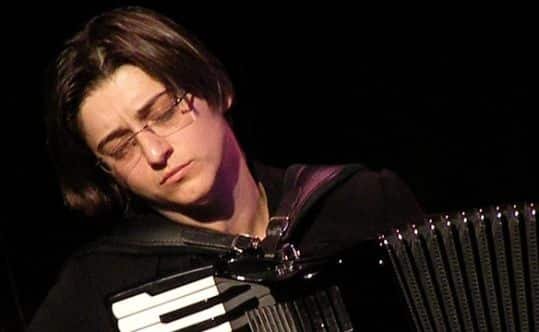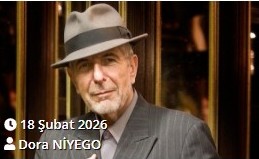by Avishay Artsy

Sarajevo native Merima Ključo can relate to the story of the Sarajevo Haggadah, the 14th-century illuminated manuscript that survived many close calls with destruction. Both have escaped war and have received acclaim for their artistic beauty.
Ključo, a renowned Los Angeles-based concert accordionist, is a survivor of the ethnic strife in the Balkans in the 1990s, having escaped Bosnia in 1993. The haggadah was handwritten in Spain around 1350 and brought to Sarajevo after the expulsion of the Jews from Spain in 1492. It surfaced in Italy in the 16th century before finding its way to the National Museum of Bosnia and Herzegovina in Sarajevo in 1894. During the Holocaust, the manuscript was hidden from the Nazis by the museum’s chief librarian and by a Muslim cleric. It also survived in an underground bank vault during the siege of Sarajevo by Bosnian Serb forces.
“I am fascinated by the Sarajevo Haggadah, not only because of its amazing and fascinating history, but also because it reminds me of my own life and the ‘Exodus’ I had to experience,” Ključo wrote in an email. “In its journey, the Haggadah suffered transformations which make it even more special by giving it a richer history that reflects its passage through different cultures.”
Ključo will perform her multimedia presentation, “The Sarajevo Haggadah: Music of the Book,” at UCLA’s Schoenberg Music Building in the Jan Popper Theater on April 13 at 8 p.m., as part of UCLA’s Jewish Music Concert Series. The concert is free and open to the public.
The piece premiered as a work-in-progress at Yellow Barn’s Sandglass Theater in Putney, Vt., in 2013. It was inspired by Geraldine Brooks’ 2008 novel “People of the Book,” which fictionalized the haggadah’s odyssey from Muslim Spain to its permanent residency at the National Museum in Sarajevo. Brooks is a Pulitzer Prize-winning writer who reported on the Bosnian war for The Wall Street Journal.
The Sarajevo Haggadah was handwritten on bleached calfskin and illuminated in copper and gold. It begins with 34 pages of illustrations of Bible scenes, from creation to the Hebrews’ escape from Egypt to the death of Moses. Wine stains speckle the pages, proof that it was used at many Passover seders.
“I also travel around the world, and with every journey I get a new ‘scar,’ positive or negative, but I keep my dignity and get richer by travelling through different circumstances, and sharing my culture with others through my music,” Ključo wrote.
Ključo’s multimedia piece has toured the United States with support from the Foundation for Jewish Culture, but this will be the L.A. premiere of the performance. It will feature Ključo on accordion and Seth Knopp playing prepared piano (a piano that has had its sound altered), accompanied by Bart Woodstrup’s video art.
Woodstrup, Ključo wrote, “created a visual backdrop to the music that subtly interweaves the imagery of the Sarajevo Haggadah with elements of the book’s history. Inspired by the textures found in the illustrations, as well as the stains and signs of aging found in the book, Bart literally ‘illuminates’ and animates those elements with a variety of digital software techniques.”
The animations are almost entirely composed of imagery from the book, yet arranged in an abstract way that complements the musical performance.
Ključo used the Sarajevo Haggadah’s 600-year journey as a plot for developing a musical and a visual story. The composition has 12 movements, which illustrate the haggadah’s journey during its long history, bringing together the musical traditions of Sephardic Jews, Spain, Italy, Austria, Bosnia and Herzegovina. Its travels “through different cultures, their musical traditions [and] their religious influences shows how the struggle for survival of this valuable book brought together many people that belong to different cultural backgrounds, creating a metaphysical dialogue that transcends time and space,” Ključo wrote.
Ključo has performed as a guest soloist with the Scottish Chamber Orchestra, Holland Symphonia and the Netherlands Radio Philharmonic Orchestra, among others. She also worked with Theodore Bikel on the play “Sholom Aleichem: Laughter Through Tears” and performed at the legendary actor and singer’s 90th birthday celebration last year at the Saban Theatre in Beverly Hills.
Ključo’s score for accordion and prepared piano borrows from the musician’s own culturally rich past. Her native Bosnia, in the former Yugoslavia, “was always open to all sorts of musical styles,” she wrote. “I had access very early on to music from all over the world, especially from the Balkans and other regions of Eastern Europe.”
“The Sarajevo Haggadah: Music of the Book” is based on the Sephardic traditions of different countries that the haggadah visited as it traveled through history.
“She really examined a lot of Sephardic music from Sarajevo, because Sarajevo was a really famous and important city as part of the Sephardic Diaspora after the Inquisition in the late 15th century,” said Neal Brostoff, a Jewish music scholar and the coordinator of the music series, presented by the Mickey Katz Endowed Chair in Jewish Music at UCLA. “Merima grew up knowing Sephardic Jews and their music, and that really plays an important role in the ‘Sarajevo Haggadah’ piece.”
“Sephardic Jews observed the traditions of their home countries, and infused Jewish culture into the music of their adopted lands,” Ključo wrote. “This resulted in musical similarities. For example, Bosnians and Sephardic Jews use the same scales and rhythms. They share the same emotion in their songs, the same pleasures and the same pain. In the end they share the same country, the same customs and the same food. They learn from each other. And an interesting note: Many Sephardic songs from Bosnia are about celebrating Passover.”
Upcoming concerts in the UCLA Jewish Music Series include pianist/composer Uri Caine (former composer-in-residence with the Los Angeles Chamber Orchestra) performing selections from John Zorn’s “Masada Songbook” together with UCLA jazz students on April 30 at 8 p.m.; a lecture titled “Composing Culture and Improvising Identity: Jewish Themes in Avant-Garde Jazz” featuring Caine, Harvard University visiting professor Tamar Barzel and moderated by Robert Fink, professor of musicology at UCLA, on April 30 at 6 p.m.; and “Convergence,” featuring Anthony Mordechai Tzvi Russell, in collaboration with the Berkeley-based Yiddish music ensemble Veretski Pass, presenting a new repertoire of works exploring exile, spirituality, hope and redemption, on May 6 at 8 p.m.
Merima Ključo will perform “The Sarajevo Haggadah: Music of the Book” at UCLA’s Schoenberg Music Building in the Jan Popper Theater on April 13th at 8 pm. For more information, visit arts.ucla.edu/calendar.
Fuente: jewishjournal.com
 eSefarad Noticias del Mundo Sefaradi
eSefarad Noticias del Mundo Sefaradi

